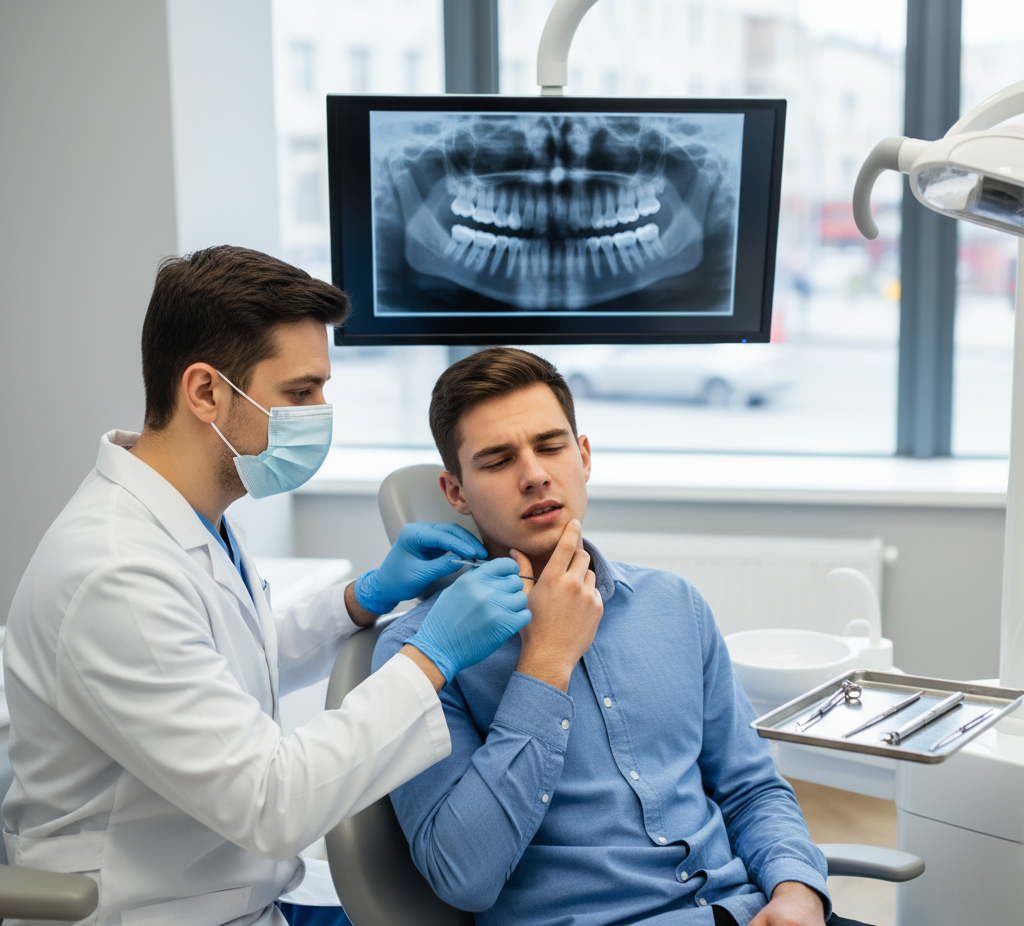Dental emergencies can strike unexpectedly, leaving patients in pain and unsure where to turn. Understanding emergency dental care is crucial to ensure timely treatment, prevent complications, and maintain overall oral health. At Apple Tree Dental, our Emergency Dentist London provides compassionate, prompt, and professional services to help patients regain comfort and confidence.
What Is Emergency Dental Care?
Emergency dental care addresses urgent oral health issues that require immediate attention. These situations include severe tooth pain, broken or knocked-out teeth, infections, and other dental injuries. Unlike regular dental visits, emergency care focuses on relieving pain, preventing further damage, and stabilizing the patient’s condition.
Common Dental Emergencies
Here are some common scenarios that require urgent dental attention:
- Severe Tooth Pain – Persistent or sudden tooth pain may indicate cavities, infection, or trauma. Ignoring severe pain can lead to abscesses or permanent damage.
- Knocked-Out or Broken Teeth – Accidents or sports injuries can cause teeth to be dislodged or fractured. Immediate dental intervention can sometimes save the tooth.
- Dental Infections – Swelling, fever, and severe pain often indicate an infection, which may spread if untreated.
- Lost Fillings or Crowns – While not always painful, lost restorations expose teeth to further damage or decay.
- Soft Tissue Injuries – Cuts, lacerations, or injuries to the gums, tongue, or lips need prompt attention to prevent infection and promote healing.
When to Seek Emergency Dental Care
Not all dental issues are emergencies, but you should seek care if you experience:
- Severe, persistent tooth pain
- Swelling in your gums or face
- Bleeding that does not stop
- A knocked-out tooth
- Signs of infection such as pus or fever
At Apple Tree Dental, we emphasize prompt attention to these symptoms to prevent complications and protect your oral health.
How Emergency Dental Care Works
When you arrive at an emergency dental clinic:
- Assessment – The dentist evaluates the severity of the issue and identifies the underlying cause.
- Pain Management – Immediate pain relief is provided through medication or temporary procedures.
- Treatment Plan – Depending on the situation, treatment may include fillings, root canals, extractions, or other interventions.
- Follow-Up Care – After stabilizing the emergency, your dentist will outline follow-up treatment to restore full oral health.
Benefits of Visiting an Emergency Dentist
Seeking professional help quickly has several advantages:
- Pain Relief – Prompt treatment can significantly reduce discomfort.
- Prevent Further Damage – Immediate care can save teeth and prevent worsening conditions.
- Avoid Complications – Untreated infections or injuries can lead to systemic health problems.
- Peace of Mind – Knowing a trusted dentist is available reduces stress and anxiety.
Tips for Handling Dental Emergencies at Home
While professional care is essential, you can take temporary measures to manage the situation until you reach your dentist:
- Rinse your mouth with warm salt water to reduce swelling and clean the area.
- Apply a cold compress to reduce pain and inflammation.
- Use over-the-counter pain relief as advised by a healthcare professional.
- Avoid chewing on the affected side to prevent further damage.
- Keep a knocked-out tooth moist in milk or saline solution if you plan to reinsert it.
Why Choose Apple Tree Dental in London?
Apple Tree Dental is dedicated to providing comprehensive emergency dental care in London. Here’s why patients trust us:
- Experienced Dentists – Our team specializes in emergency treatments and trauma management.
- State-of-the-Art Facility – Equipped with modern tools for efficient diagnosis and treatment.
- Quick Response – We prioritize urgent cases to ensure timely care.
- Patient-Centered Approach – Comfort, safety, and personalized treatment are our top priorities.
Preventing Dental Emergencies
Prevention is always better than cure. Follow these tips to reduce the risk of dental emergencies:
- Maintain regular dental check-ups and cleanings.
- Wear protective gear during sports and physical activities.
- Avoid chewing hard objects like ice or pens.
- Practice good oral hygiene, including brushing and flossing daily.
Frequently Asked Questions (FAQs)
Q1: What counts as a dental emergency?
A: Severe pain, knocked-out teeth, dental infections, and significant injuries to teeth or gums are considered emergencies.
Q2: Can a knocked-out tooth be saved?
A: Yes, if treated promptly. Keep the tooth moist in milk or saline solution and see a dentist immediately.
Q3: How quickly should I see an emergency dentist?
A: Ideally, within 24 hours for severe pain or trauma. Some cases, like knocked-out teeth, require attention within an hour.
Q4: Will emergency dental care be painful?
A: Dentists use local anesthesia and modern techniques to minimize pain and discomfort during emergency treatment.
Q5: Does insurance cover emergency dental care?
A: Many dental insurance plans cover emergency procedures, but coverage varies. Check with your provider beforehand.
Conclusion
Dental emergencies can happen unexpectedly, but timely and professional care can prevent complications and restore oral health. Apple Tree Dental in London offers reliable, compassionate, and efficient emergency dental services to ensure patients receive the care they need when it matters most. By understanding the signs of dental emergencies and seeking immediate help, you can protect your smile and overall well-being.

